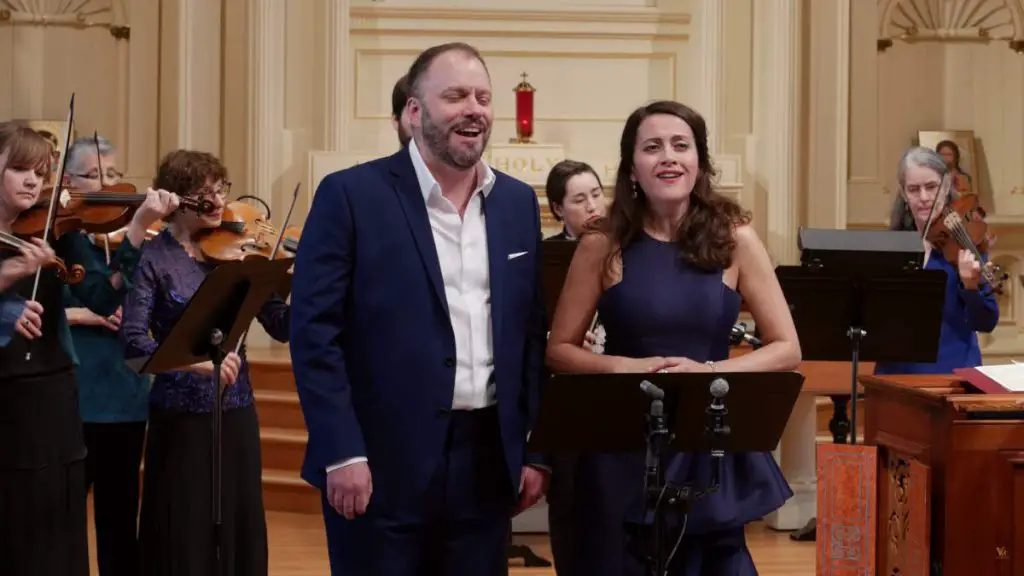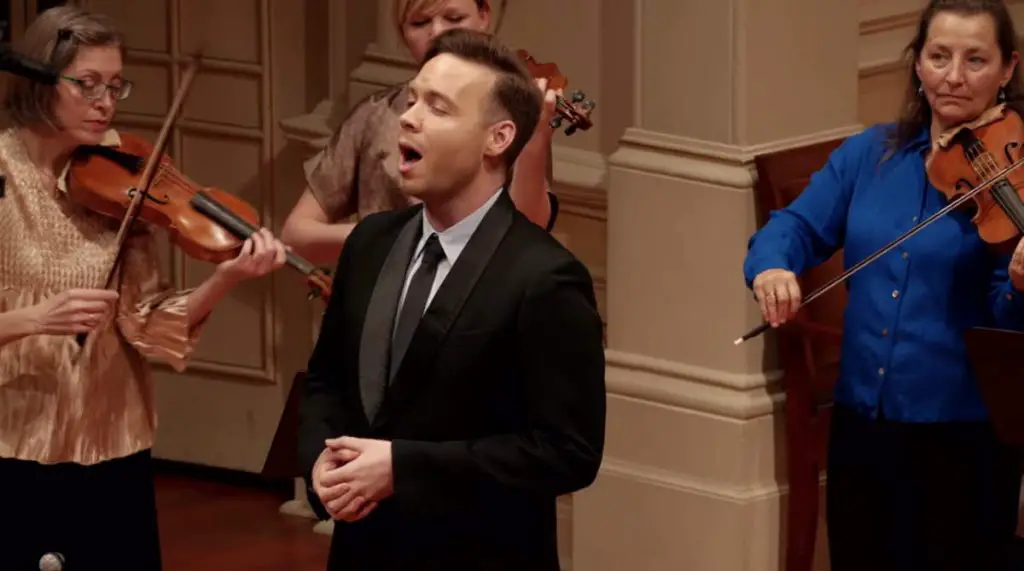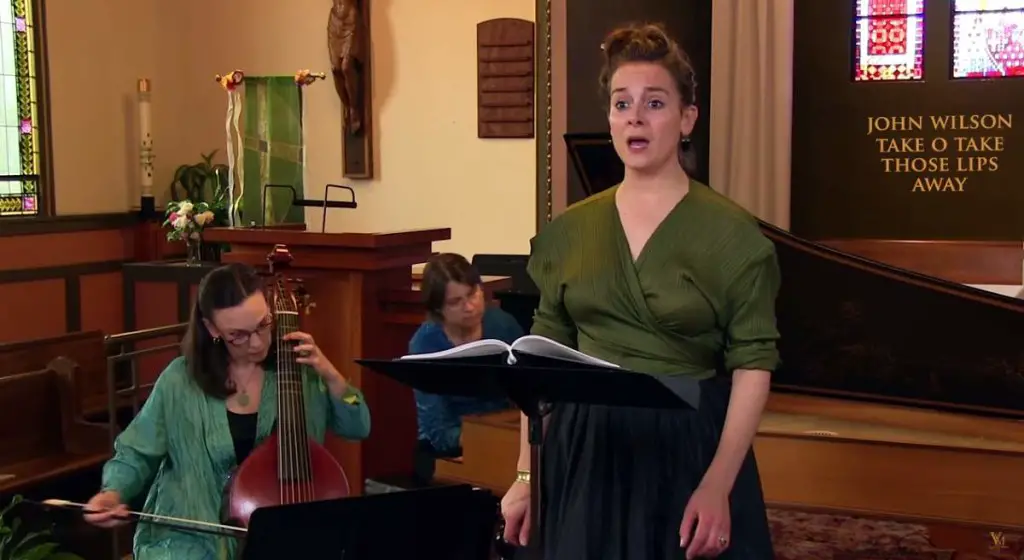Accompanied by the award-winning early music ensemble Voices of Music, the American light lyric soprano Amanda Forsythe and the American tenor Thomas Cooley perform Georg Friedrich Händel‘s “As Steals the Morn”, an aria from the 1743 oratorio, “L’Allegro, il Penseroso ed il Moderato” (The Cheerful, the Thoughtful, and the Moderate Man). Marc Schachman and Anna Marsh, baroque oboe & bassoon. A 4K, ultra high definition video from the ensemble’s award-winning concert “As Steals the Morn,” March 2019. This concert placed first in the San Francisco Classical Voice (SFCV) “Best of the Bay” awards, 2018-2019.
Georg Friedrich Händel’s As Steals the Morn
“As Steals the Morn” is an aria from George Frideric Handel’s 1743 oratorio, “L’Allegro, il Penseroso ed il Moderato”. The oratorio was based on the poetry of the English poet and intellectual John Milton (9 December 1606 – 8 November 1674).
Handel was a German-born, British Baroque composer, well known for his operas, oratorios, anthems, and organ concertos. He wrote the oratorio “L’Allegro, il Penseroso ed il Moderato” after the success of his “Messiah” and it was first performed in 1740. The work is based on the English poet John Milton’s (9 December 1608 – 8 November 1674) two contrasting poems, L’Allegro (The Cheerful Man) and Il Penseroso (The Thoughtful Man). These poems represent contrasting aspects of life: joy and contemplation. Handel added Il Moderato (The Moderate Man), which was not part of Milton’s original work but was written by English landowner and patron of the arts Charles Jennens (1700 – 20 November 1773) for the oratorio.
The idea behind Il Moderato is to create a balance between the two extremes presented by Milton. In Baroque music and philosophy, the concept of moderation or temperance was highly valued. By placing Il Moderato between the two contrasting emotional states of L’Allegro and Il Penseroso, Handel provides a middle ground – an ideal of balance between the exuberance of joy and the depth of thoughtfulness.
Thus, a Baroque composer like Handel might insert a Moderato to reflect the period’s emphasis on harmony, order, and the avoidance of extremes, aligning with the broader philosophical notion that the ideal life embraces moderation between contrasting passions.
“As Steals the Morn” is one of the most famous arias from the work. It’s a duet sung by two characters – the personifications of Mirth (L’Allegro) and Melancholy (Il Penseroso) in the third part of the oratorio, titled ‘il Moderato’. The text was written by Jennens and depicts the arrival of the morning as a soft and gentle transition.
As with many of Handel’s works, “As Steals the Morn” is characterized by its complex and emotive musicality. It’s written in the form of a da capo aria, which was a common structure in Baroque vocal music, featuring an ABA form where the first section is repeated after a contrasting middle section.
The beautiful and expressive music of “As Steals the Morn” is emblematic of Handel’s unique ability to musically render dramatic and emotional subtleties, creating an immersive and emotive experience for the listener.
As Steals the Morn lyrics
As steals the morn upon the night,
And melts the shades away:
So Truth does Fancy’s charm dissolve,
And rising Reason puts to flight
The fumes that did the mind involve,
Restoring intellectual day.
These lyrics refer to the dawn breaking (“As steals the morn upon the night, And melts the shades away”), as an allegory for truth dispelling illusion (“So Truth does Fancy’s charm dissolve”), and the dawn of understanding and reason (“And rising Reason puts to flight The fumes that did the mind involve, Restoring intellectual day”).
The words are filled with a sense of renewal and clarity, capturing the moment when darkness is replaced by the light of day, or when confusion gives way to understanding. The reference to “the fumes that did the mind involve” suggests a sense of being lost or clouded in thought, while “restoring intellectual day” implies a return to clear thinking and understanding. This sense of clarity and understanding, both literal and metaphorical, is reflected in Handel’s music.
Amanda Forsythe

Amanda Forsythe (born 1976) is an American light lyric soprano who is particularly admired for her interpretations of baroque music and the works of Rossini. Forsythe has received continued critical acclaim from many publications including Opera News, The New York Times, The Wall Street Journal, and the Boston Globe.
Amanda Forsythe was born in 1976 in New York City, with a sister, and grew up on Roosevelt Island and later in Lloyd Harbor, New York, where she graduated from Cold Spring Harbor High School.
She entered Vassar College in 1994 where she initially studied marine biology. Forsythe graduated from Vassar in 1998 with a degree in music and went on to graduate studies in vocal performance at the New England Conservatory of Music. While there she was a student of Mary Ann Hart and Susan Clickner. Forsythe was not accepted into the conservatory’s opera workshop program, so the soprano ended up seeking performance opportunities elsewhere while continuing to study at NECM.
Forsythe ended up performing in a production of Cavalli’s Giasone at Harvard University. This production impacted Forsythe’s life positively in both professional and personal ways. The opera introduced her to her husband, conductor Edward Elwyn Jones (they met while doing this opera and married in the summer of 2005), and Martin Pearlman, the director of Boston Baroque. Pearlman came to one of the opera’s performances and was so intrigued by Forsythe’s performance that he asked her to come and audition. Forsythe has subsequently been cast in numerous productions with the company.
In 2003, she was the winner of the George London Foundation Awards and the second-place winner of the Liederkranz Foundation competition. Forsythe received an honorable mention in the 2005 Walter W. Naumburg Foundation Awards. She was also a vocal fellow at Tanglewood Music Center for two summers and has apprenticed at Chicago’s Ravinia Festival and the Caramoor Festival. At Tanglewood, she originated the role of young Margarita in the world premiere of Osvaldo Golijov’s Ainadamar and replaced Dawn Upshaw in the lead role for one performance.
Forsythe made her professional debut in 2001 as Proserpina/Ninfa in Monteverdi’s L’Orfeo with Boston Baroque.
In the 2002-2003 season, Forsythe performed the role of Cleopatra in Handel’s Giulio Cesare in Egitto with Hudson Opera Theatre. She also performed the role of Amore in Monteverdi’s Il ritorno d’Ulisse in patria with Boston Baroque.
In the 2003-2004 season, Forsythe performed Bach’s Wedding and Coffee Cantatas and the role of Oberto in Handel’s Alcina with Boston Baroque. She also made her debut at the Caramoor Festival in two productions created by the Handel and Haydn Society. These included the role of Cendrillon in Pauline Viardot’s Cendrillon and as Un Trojano in Gluck’s Paride ed Elena.
In the 2004-2005 season, Forsythe performed the role of Serpina in Pergolesi’s La serva padrona with Boston Baroque.
In the 2005-2006 season, Forsythe made her debut with Opera Boston and Opera Unlimited as the Angel in Peter Eötvös’s Angels in America. She also sang various roles in Boston Baroque’s production of Purcell’s The Fairy-Queen, including the role of the Chinese woman who sings the famous aria “Hark how the echoing air”.
In the 2006-2007 season, Forsythe made her debut at the Boston Early Music Festival performing the role of Aglaure in the North American premiere of Lully’s Psyché. She also recorded the role in the landmark first recording of this opera. In addition, she sang the role of Vagaus in Boston Baroque’s production of Vivaldi’s oratorio Juditha Triumphans. She also sang Handel’s Messiah with the Charlotte Symphony and Apollo’s Fire.
In the 2007-2008 season, Forsythe made her European debut singing Corinna in Rossini’s Il viaggio a Reims at the Rossini Opera Festival in Pesaro. She also made her debut at the Grand Théâtre de Genève and the Bayerische Staatsoper as Dalinda in Handel’s Ariodante and returned to Opera Boston to perform the role of Iris in Handel’s Semele. She also reprised the role of Young Margarita in Osvaldo Golijov’s Ainadamar with the Calgary Philharmonic. In addition, Forsythe will perform Mahler’s 2nd Symphony with the Orquesta Sinfónica Nacional de Mexico and will also make her debut at La Fenice in a concert of Rossini arias.
In the 2008-2009 season, Forsythe is scheduled to sing Rosalia in Rossini’s L’equivoco Stravagante and in a recital with Joyce DiDonato at the Rossini Opera Festival. She will also perform the role of Atalanta in Handel’s Xerxes with Boston Baroque, Venus in Blow’s Venus and Adonis at the winter Boston Early Music Festival, Barbarina in Mozart’s Le nozze di Figaro at the Théâtre des Champs-Élysées, and Ellenia in Christoph Graupner’s Antiochus und Stratonica at the summer Boston Early Music Festival. Additionally, Forsythe will appear in concerts with the Netherlands Radio Symphony Orchestra, Apollo’s Fire: the Cleveland Baroque Orchestra, Orquesta Sinfónica de Tenerife, and at the Festival Casals.
Ms. Forsythe can be heard as Minerve and La Grande Pretresse on the Boston Early Music Festival recording of Lully’s Thésée, a nominee for the 50th Grammy Awards and Eurydice in Charpentier’s La Descente d’Orphèe aux Enfers H 488.
Forsythe has also performed at the Harvard Early Music Society and with the Masterworks Chorale, the Los Angeles Philharmonic, the Rhode Island Philharmonic, the Florestan Project, the Omaha Symphony, the Hartford Symphony, the Louisiana Philharmonic, the Boston Chamber Music Society among other organizations.
In the 2017-2018 season, Forsythe performed the role of Iole in Handel’s Hercules with the Handel and Haydn Society.
Thomas Cooley
Praised by the New York Times for his “sweet, penetrating lyric tenor with aching sensitivity,” and by San Francisco Classical Voice as “an indomitable musical force,” Thomas Cooley is a singer of great versatility, expressiveness, and virtuosity.
He has collaborated with conductors such as Teodor Currentzis, Nicholas McGegan, Robert Spano, Manfred Honneck, Donald Runnicles, Helmuth Rilling, Osmo Vänskä, Eji Oue, David Robertson, Markus Stenz, Bernard Labadie, Jane Glover, and Franz Welser-Möst
Internationally in demand for a wide range of repertoire in concert, opera, and chamber music, Cooley performs regularly with major orchestras such as the Atlanta, St. Louis, and National Symphonies; the Minnesota Orchestra and St. Paul Chamber Orchestra; Los Angeles Chamber Orchestra, Orchestre Symphonique de Quebec; Copenhagen Philharmonic; Bavarian Radio Symphony; Orchestra Sinfonica Giuseppe Verdi; the Gewandhaus Orchestra Leipzig; and the Osaka Philharmonic.
Thomas Cooley’s repertoire on the symphonic stage includes works such as Beethoven’s Missa Solemnis; Berlioz’s Requiem; productions of Britten’s Peter Grimes and War Requiem in Carnegie Hall as part of the Britten Centennial; Haydn’s Creation; Britten’s Serenade and Les Illuminations; Mendelssohn’s Elijah; Elgar’s Dream of Gerontius; Rihm’s Deus Passus; Mahler’s Lied von der Erde; Penderecki’s Credo, and Kodály’s Psalmus Hungaricus. Recent highlights include a tour of Mozart’s Requiem with musicAeterna, and the world premiere and recording of Christopher Theofanidis’s Creation/Creator with Atlanta Symphony.
Other important recordings include Beethoven’s Symphony No. 9 with the Copenhagen Philharmonic and the title role in Handel’s Samson with Nicholas McGegan and the Festspiel Orchester Göttingen.
Renowned for his agility and skill in Baroque music, Mr. Cooley is in demand, particularly as an interpreter of the works of Bach and Handel. This year, he returns for his 10th season as the tenor soloist at the Carmel Bach Festival. He was named Artist-in-Residence by Music of the Baroque in Chicago in the 2015-16 season.
Of his Evangelist with Jane Glover, the Chicago Tribune wrote, “In the stylish tenor Thomas Cooley she had an ideal Evangelist, firm of voice and commanding of expression. So intensely did he penetrate the long and demanding narration that the familiar saga took on the urgency of on-site reportage.”
He appears regularly with such groups as Philharmonia Baroque Orchestra, Boston Baroque, Handel and Haydn, Akademie für Alte Musik Berlin, Les Violons du Roy, and the Göttingen Händelfestspiele.
Important recent engagements of Baroque music include Telemann’s Tag des Gerichts in the Concertgebouw in Amsterdam; the Evangelist in St. John Passion on tour in Italy with the Munich Bach Choir; Purcell’s Indian Queen with musicAeterna, Bach’s Lutheran Masses with Violons du Roy in Montreal, Evangelist in Bach’s St. Matthew Passion with the Seattle Symphony, Handel’s Joshua with Philharmonia Baroque and created the role of Acis in a new production of Acis and Galatea with the Mark Morris Dance Group.
A program of Handel arias and duets entitled “As Steals the Morn” with San Francisco’s Voices of Music was selected as the best Early/Baroque performance in the Bay Area in 2019 and a video of one of the selections of this concert has received over one million views.
On the operatic stage, he has performed many of the great tenor roles in the operas of Mozart, including Tamino, Belmonte, Ferrando, Don Ottavio, and the title role in Idomeneo. Other roles include Count Almaviva in Rossini’s Barbiere di Siviglia, the title role in Bernstein’s Candide, and Bajazet in Handel’s Tamerlano.
He was a member of the ensemble at the Gärtnerplatz Theater in Munich for four years. Additionally, he has performed at the Bavarian State Opera, the Krakow State Opera, the Cincinnati Opera, and the Göttingen Händelfestspiele, where he returns in 2021 as Grimoaldo for their 100th Anniversary production of Rodelinda.
Of his performance as Don Ottavio in the Concertgebouw with Orchestra of the 18th Century, Opera Gazette wrote, “The man sang his two arias so inhumanly beautifully-his ‘Dalla sua pace’ was a diamond -that for a moment we no longer knew what we were doing. The last thing we are aiming for is the Fritz Wunderlich police, but our thoughts wandered for a moment to the best Mozart tenor ever. Cooley’s virtuosity and expressiveness are of an extraterrestrial level. A breathtaking climax.”
Highlights of the coming season include Rodelinda in a stage/television production at the Göttingen Handel Festival, Handel’s Ode to St. Cecilia and the role of Aeneas in Dido and Aeneas at the Carmel Bach Festival, Messiah with Nicholas McGegan in Cleveland and with the Jacksonville Symphony, the Evangelist in St. Matthew Passion with St. Thomas and Trinity Wall Street in New York City, and the arias of the St. John Passion with the Columbus Symphony.
Sources
- L’Allegro, il Penseroso ed il Moderato on Wikipedia
- Amanda Forsythe on Wikipedia
- Thomas Cooley’s official website

![Händel: Sweet Bird [Amanda Forsythe, Emi Ferguson & Voices of Music]](https://cdn-0.andantemoderato.com/wp-content/uploads/2023/08/Amanda-Forsythe-Emi-Ferguson-Voices-of-Music-Handel-Sweet-Bird-1024x576.jpg)
![Amanda Forsythe sings Tornami a vagheggiar [Handel]](https://cdn-0.andantemoderato.com/wp-content/uploads/2024/01/Amanda-Forsythe-Tornami-a-vagheggiar-Handel-1024x576.jpg)
